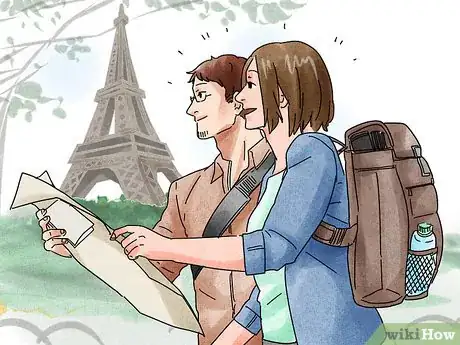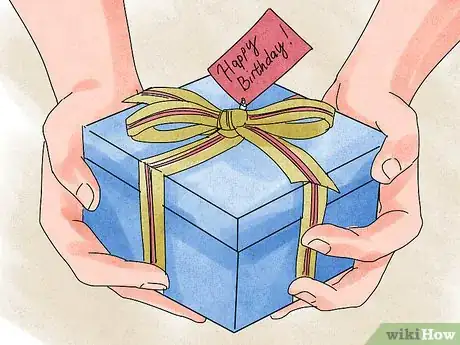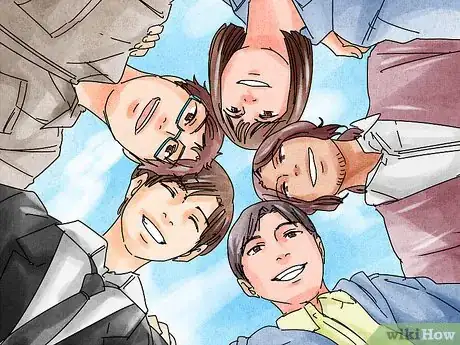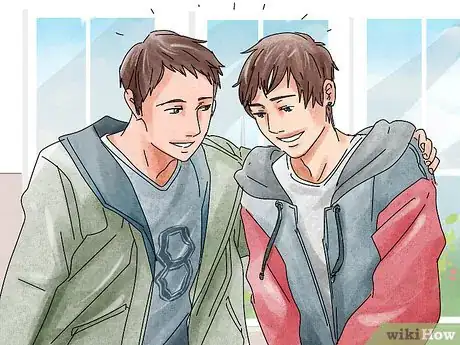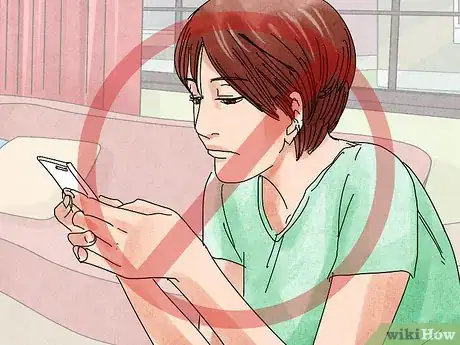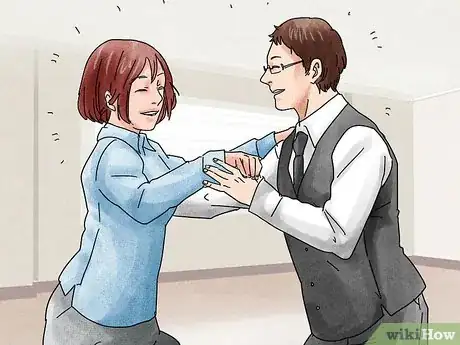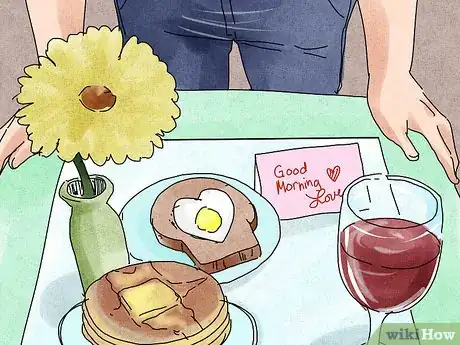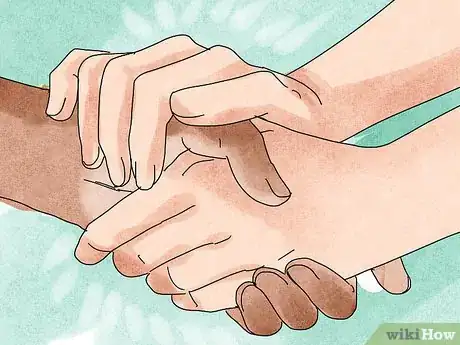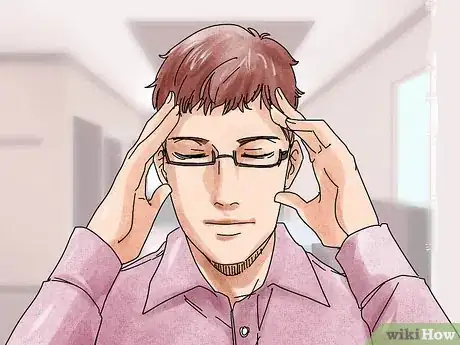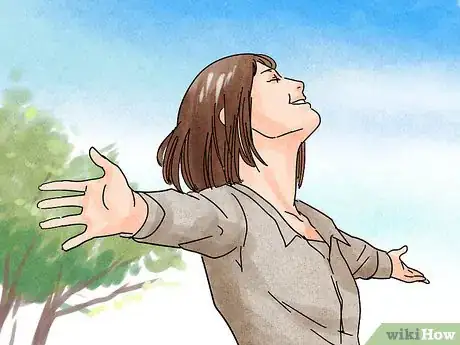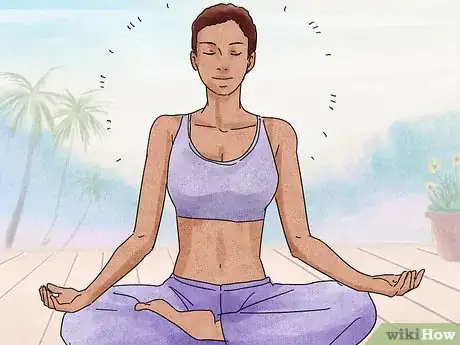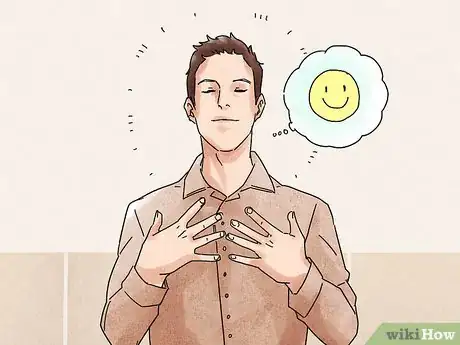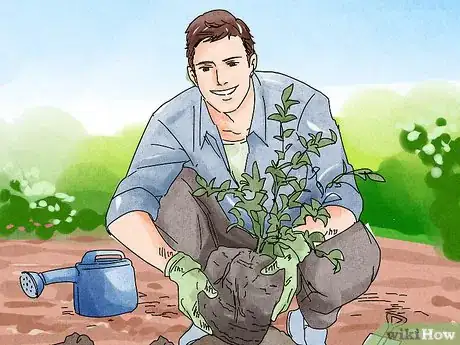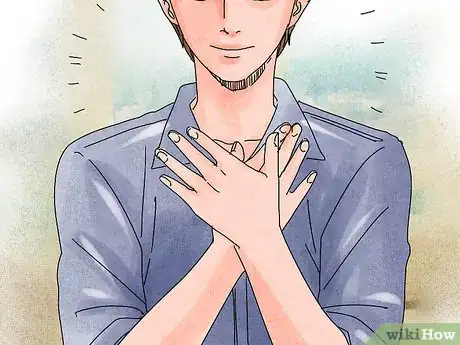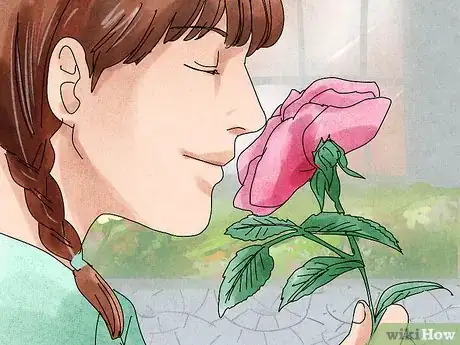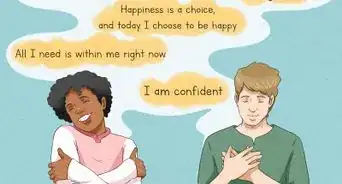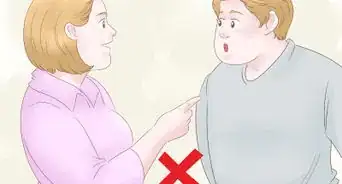This article was co-authored by Chad Herst, CPCC. Chad Herst is the Executive Coach at Herst Wellness, a San Francisco-based wellness center focused on Mind/Body Coaching. Chad is an accredited Co-Active Professional Coach (CPCC) and he has been working in the wellness space for over 19 years, with experience as a yoga teacher, acupuncturist, and herbalist. He received his BA from Columbia University and his MS in Traditional Chinese Medicine from the Pacific College of Oriental Medicine.
wikiHow marks an article as reader-approved once it receives enough positive feedback. In this case, several readers have written to tell us that this article was helpful to them, earning it our reader-approved status.
This article has been viewed 121,409 times.
The expression "stop and smell the roses" is not simply about flowers, but rather about how to live your life with a deeper appreciation of the world around us. It reminds us to slow down and notice the little things that make life worthwhile. Despite a busy life, it is important to know how to be present in the moment; otherwise, those moments will pass you by. As the National Institute of Health puts it, it’s easy to fall into “autopilot,” but your ability to hit the pause button is essential to leading a fulfilling life![1]
Steps
Making Time for Family and Friends
-
1Take time out of your schedule be with your family. Quality time with your parents, children, relatives, and spouse can have a lasting impact on their overall physical and mental health. Our busy lives often get in the way of developing connections and spending needed time with family and friends. Here are some ways spend quality time:
- Have dinner around a dinner table, rather than in front of the TV, so that you have more time to connect.
- Go on road trips, sightsee, or share new experiences together.
- Visit relatives that you don't see as often or make time to call or write them.
-
2Remember important dates and events, like birthdays and graduations. Make that day special, and be present in all ways possible, physically and mentally. Participate in the interests of your family. By remembering the things that matter to them most, you can build a stronger bond with your loved ones.
- Keep a calendar and mark down any special days ahead of time, so you don't forget things like game days, dance rehearsal, or anniversaries. By keeping a schedule, you'll be better able to prioritize it.
Advertisement -
3Connect more with your friends. While it's important to make time for your family, your friends are like your second family. Make sure that not all your time is consumed by one person or thing. Friends can help to keep things in perspective.
- Have coffee or tea with friends, and see what going on in their lives.
- Meet up with a friend regularly. Don't let school work, your job, or your daily chores consume you so that all you do is text or email them. Connecting in person, rather than online or by phone, can have a lasting impact.
-
4Have one-on-one time with friends and relatives. While many social activities are done in groups, like family gatherings or outings with friends, it's important to build closer relationships with people, and really get to know how they're doing. This is particularly true with a sibling or friend who is going through a tough time.
- Set aside time to make them feel special. Showing empathy is part of being "present in the moment."[2]
Building Deeper Relationships
-
1Be present. Put away your cell phone, tablet, laptop, and other devices that distract. Be present in the moment with the people around you. It's easier now to multi-task with modern technology, but it often lessens the experience of "being in the moment."
- Be open to listening to those around you by taking the time to really hear what they are saying. Notice their body language, and tune-in to their actions.
-
2Laugh and be playful together. Share in activities with others that bring joy. Make the everyday experiences more memorable by sharing them together. Going to the grocery store can be an adventure. Making dinner together can be rewarding.
- Humor can make ordinary things seem fun.
-
3Make your partner, spouse, or boyfriend/girlfriend feel special. No matter if you are just starting out in a relationship, or have been married for 30 years, it's important to show that you care about your partner even after all these years. [3]
- Make a special meal for your partner. Be creative. Putting in effort that goes beyond the usual routine is often rewarding for both of you.
- Give a small gift to show your love. Whether it's a single rose, a handmade craft, or a card, it makes a world of difference to show you care. Small surprises can become lasting memories and help to build stronger relationships.
-
4Give back with a simple act of kindness. As you become more busy, you may start to be in a sort of "bubble" of school, work, and home, wherein you forget that there are lots of other people going through stressful times like you. So while you're rushing to get from Point A to Point B, stop for a minute and look at the people around you. There might be someone in need, or who is feeling down. Be kind to them, even in the smallest of ways.
- Sometimes the smallest gesture of kindness can change someone's outlook on their day, their week, their year, or their life.
Appreciating the Small Things
-
1Be mindful about the world around you. When your day is filled with work, chores, or activities, you may lose touch with yourself. Through the act of mindfulness, you are making a gentle effort to be continuously present by:[4]
- Being present "on purpose" through a conscience direction of awareness.
- Being attentive to the present moment. Your mind may be racing with things to do, and people to see, but instead you focus on the simpler things.
- Being non-judgmentally aware. By paying more attention to the moment, you experience more about the world around you. You may listen or see more than before, because of your heighten awareness.
-
2Be positive and live happier. Studies have shown that being more appreciative about one's life and one's world will lead people to live more fulfilled lives. The act of paying attention to the good things in life, and being appreciative actually makes people happier.[5]
- Surround yourself with positive people who don't always focus on the negative.
- Focus on the present moment, and find something in your line of vision that makes you happy. Hold that image in your mind, and focus on it in a positive way.
-
3Meditate. This is a helpful practice for mindfulness, as a way to clear your head of negative or hyperactive thoughts. It can make you feel "centered" in a chaotic world.
-
4Use positive affirmations throughout the day. How we see the world is all a matter of the mind. Our mind can be shaped and changed. One way is through positive rather than negative statements about yourself. Affirmations can build your confidence, and keep you focused on the good things in life.[6]
-
5Get in touch with nature. In our daily lives, we are often disconnected with nature, and all its beauty. Our Earth is a reminder of how precious life is. Appreciate the little things, both big and small:
- Walk along a beach, river, or lake. The sound of water can be calming.
- Notice the birds in the trees or sky. Watching a large bird migration can be magical.
- Go star-gazing. The universe is big and beautiful.
-
6Be thankful. Take a deep breath and look around you. While there are things that you wish could be better, be grateful for the things that you have, and the beauty of living on this Earth. You only have one life to live, and it is yours.
-
7Stop and smell the roses--literally. Go into a florist shop, or a garden, or even out in the wild. Flowers are beautiful, and smell oh-so-sweet. The scent of a fresh flower is like nothing else.
- Sometimes when we see a lot of flowers at once, we forget the beauty that each has. Look at one flower closely. Notice things about it that you never saw before.
Expert Q&A
-
QuestionWhat are the benefits of meditating?
 Chad Herst, CPCCChad Herst is the Executive Coach at Herst Wellness, a San Francisco-based wellness center focused on Mind/Body Coaching. Chad is an accredited Co-Active Professional Coach (CPCC) and he has been working in the wellness space for over 19 years, with experience as a yoga teacher, acupuncturist, and herbalist. He received his BA from Columbia University and his MS in Traditional Chinese Medicine from the Pacific College of Oriental Medicine.
Chad Herst, CPCCChad Herst is the Executive Coach at Herst Wellness, a San Francisco-based wellness center focused on Mind/Body Coaching. Chad is an accredited Co-Active Professional Coach (CPCC) and he has been working in the wellness space for over 19 years, with experience as a yoga teacher, acupuncturist, and herbalist. He received his BA from Columbia University and his MS in Traditional Chinese Medicine from the Pacific College of Oriental Medicine.
Mindfulness Coach Meditation actually changes your brain. Burnout happens because we're constantly reacting to stimuli. When you meditate, it lessens the reactivity of the mind. It's actually reshaping your brain: certain portions shrink, which makes us less reactive, and other portions thicken, which enables us to have a better sense of how to achieve our goals.
Meditation actually changes your brain. Burnout happens because we're constantly reacting to stimuli. When you meditate, it lessens the reactivity of the mind. It's actually reshaping your brain: certain portions shrink, which makes us less reactive, and other portions thicken, which enables us to have a better sense of how to achieve our goals.
References
- ↑ https://newsinhealth.nih.gov/2012/01/mindfulness-matters
- ↑ https://www.theguardian.com/society/2016/feb/02/tea-and-sympathy-nhs-sees-the-value-of-friendship-home-visit-lonely-elderly-patients
- ↑ http://www.eharmony.com/dating-advice/relationships/four-ways-to-create-powerful-lasting-attraction-in-a-relationship/#.V3xcdjX_pRc
- ↑ http://www.wildmind.org/applied/daily-life/what-is-mindfulness
- ↑ http://greatergood.berkeley.edu/article/item/a_scientific_reason_to_stop_and_smell_the_roses
- ↑ http://www.successconsciousness.com/how-to-be-positive.htm
About This Article
If you want to stop and smell the roses, or slow down and appreciate the small things in life, start making time for the people who matter most to you! For instance, call a relative you haven’t talked to in awhile or set a monthly coffee date with a friend you don’t see often. While it may be difficult to live in the moment, you can be more present by putting away your cell phone when you’re with loved ones so you can focus your full attention on your time together. When you’re alone, appreciate the small things by practicing mindfulness. To do this, put aside your worries for the future and focus on what you’re doing at this very moment so you can fully enjoy yourself! To learn how to get in touch with nature to remind yourself how precious life is, read more from our Mindfulness Coach!
